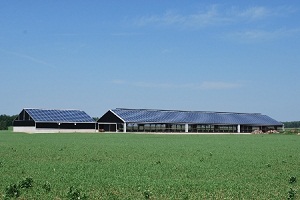Chimed Farms takes advantage of Ontario's feed-in tariff
 Toronto-based Chimed Farms will soon be making money from its recently installed photovoltaic system, thanks to the province’s generous feed-in tariff (FIT). The farm held an open house to show off the new array on June 20. The system was installed by Peak Builders Construction Services, a dealer of Fritz Construction Services of Chepstow, Ontario.
Toronto-based Chimed Farms will soon be making money from its recently installed photovoltaic system, thanks to the province’s generous feed-in tariff (FIT). The farm held an open house to show off the new array on June 20. The system was installed by Peak Builders Construction Services, a dealer of Fritz Construction Services of Chepstow, Ontario.
Thanks to the locally-produced Conergy PV modules, the array qualifies for Ontario’s feed-in-tariff program, under which Chimed Farms’ owners—and other individuals that install up to 10 megawatts of solar—are paid 80 cents per kilowatt-hour generated by the array.
“This generates far more power than what he would use on the farm in a year. All of the power produced by the system is going to go straight back on the grid,” said Paul Leikermoser, regional FIT manager for Conergy. “The connection is parallel to his electric connection. His system is a generating system.”
The array is expected to reach its financial break-even point in less than 8 years, according to a Conergy press release.
“The extra income allows Chimed Farms to diversify its income from cattle and expand its operations,” it said.
Ontario’s feed-in tariff program has been success for installers said, Mark Dupuis, lead project manager of Peak Builders Construction Services and Fritz installer.
“It’s taken off extremely fast,” said Dupuis. “We build any type of building structure. But since then [i.e., the tariff] it has taken up my entire working schedule. The market’s taken off quite a bit,”
The locally-made mandate means that only those solar system owners whose products were manufactured locally can qualify for the feed-in tariff. That means fewer companies can qualify for the tariff, limiting which modules are suitable. Still, they’ve been doing well at meeting demand.
“On an overall basis, I think suppliers have kept up reasonably well. There are times we have to wait a week or two for product, though,” said Dupuis.
Though Conergy is a German company, it has a local production facility, allowing it to meet the locally-produced mandate, Leikermoser said.
In addition, given Conergy’s German background, it’s familiar with the weather conditions that challenge Ontario.
“One of the big things in the consideration of our module is the robustness of our construction, we have a 15 millimeter frame,” he said.
The thick frame can withstand the heavy snow loads that will challenge the array, Leikermoser said.
“The snow load constraint, that’s a big issue for us in Ontario,” he said. “We have quite a bit of snow that can come at one. From a structural standpoint, the module and the racking system must be able to cope with those loads.”
Image courtesy of Conergy.



